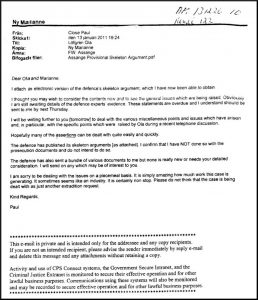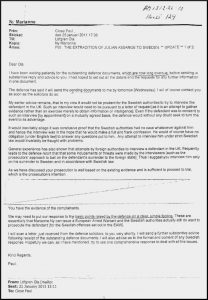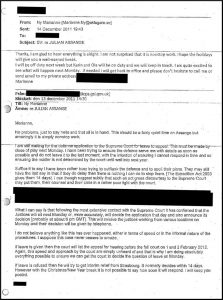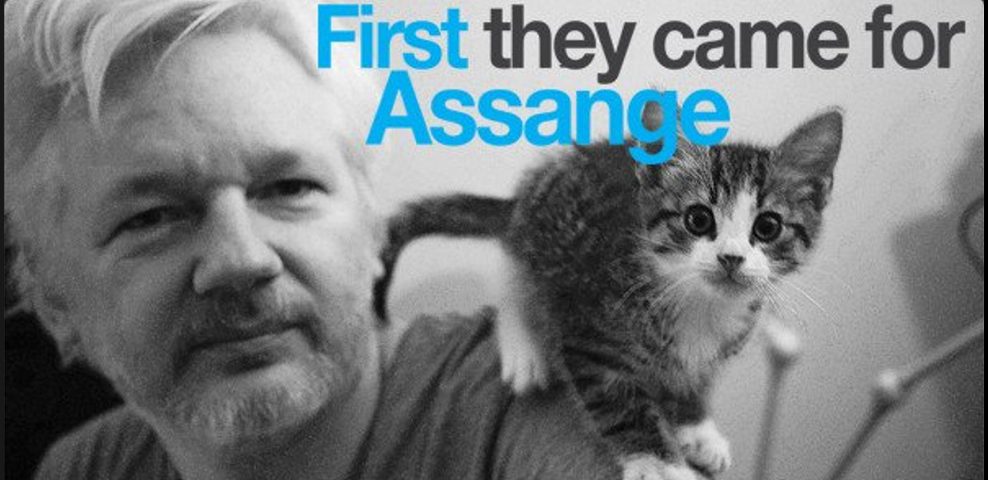by Stefania Maurizi, for Consortium News, November 6, 2018
October Let’s start with the cat. You never would have thought one of these beloved felines would play a crucial role in the Julian Assange case, would you? And yet look at the latest press coverage. The mainstream media’s headlines weren’t about a man who has been confined to a tiny building in the heart of Europe for the last six years with no end insight, they were about orders from Quito to feed his cat. There you have a man who is at serious risk of being arrested by the UK authorities, extradited to the U.S. and prosecuted for his publications. A man who has been cut off from any human contact, with the exception of his lawyers, and whose health is seriously declining due to prolonged confinement without even an hour outdoors. Considering this framework, wasn’t there anything more serious to cover than the cat?
But there’s a story to be told behind Assange’s cat. One of the last times I was allowed to visit Julian Assange in the Ecuadorian embassy in London, before the current government of Lenin Moreno cut off all his social and professional contacts, I asked the founder of WikiLeaks whether his cat had ever tried to escape from the embassy given that, unlike his human companion, he can easily sneak out of the building without the risk of being arrested by Scotland Yard.
Assange didn’t take my question with the lightness with which it was intended, quite the opposite, he became a bit emotional and told me that when the cat was small, it had in fact made some attempts to escape from the building, but as it had grown, it had become so accustomed to confinement that whenever Assange had tried to give the cat to some close friends so the animal could enjoy its freedom, it showed fear of wide open spaces. Confinement has a deep impact on the behavior and health of all creatures, animal and human.
Strength
I have worked as a WikiLeaks media partner for the last nine years, and over these nine years I have met Assange many, many times, but only once did I meet him as a free man: that was back in September 2010, the very same day the Swedish prosecutor issued an arrest warrant for allegations of rape. Initially he was under house arrest with an electronic bracelet around his ankle, then he entered the Ecuadorian embassy in London on June 19, 2012. Since then he has remained buried in that tiny embassy: a depressing building, very small, with no sunlight, no fresh air, no hour outdoors. In my country, Italy, even mafia bosses who strangled a child and dissolved his corpse in a barrel of acid enjoy an hour outdoors. Assange doesn’t.
 In these last eight years, I have never heard Julian Assange complain even once: at least in my presence, he has always reacted to the enormous stress he has been under with strength and whenever I have contacted his mother, Christine Assange, she has never wished to discuss the details of her personal feelings and concerns about the conditions of her son.
In these last eight years, I have never heard Julian Assange complain even once: at least in my presence, he has always reacted to the enormous stress he has been under with strength and whenever I have contacted his mother, Christine Assange, she has never wished to discuss the details of her personal feelings and concerns about the conditions of her son.
But for all his strength, this harsh situation is seriously undermining Assange’s physical and mental health. In an op-ed in The Guardian last January , three respected physicians, Sondra S. Crosby, Chris Chisholm and Sean Love, tried to draw attention to this problem, yet nothing has changed. Assange remains buried in the embassy in extremely precarious conditions due to the complete lack of cooperation from the UK authorities which have always refused to offer him safe passage to enjoy his asylum in Ecuador.
This lack of cooperation from the UK authorities – which can be reasonably interpreted as a deliberate effort to make Assange feel helpless, to break him down, so he’ll step out of the embassy and they can arrest him – has helped create this Catch-22 situation, with Ecuador attempting various options to find a solution, like giving Assange diplomatic status so he can leave the embassy protected by diplomatic immunity. But at the end of the day there is very little a small country like Ecuador can do, and with Lenin Moreno in power, Ecuador’s interest in protecting Assange seems to be fading to the extent that Ecuador is considering strippingAssange of his Ecuadorian citizenship, one of the most important shields protecting the WikiLeaks founder from extradition to the U.S..
The UK’s Special Interest?
Having spent the last 3 years fighting in four jurisdictions – Sweden, the UK, Australia and the U.S. – to access the full documentation on the Assange and WikiLeaks case under FOIA, I have acquired a few documents which leave no doubt as to the role played by UK authorities in contributing to create the legal and diplomatic quagmire which is keeping Assange confined to the embassy. Why have the UK authorities done this? What special interest, if any, do they have in the Assange case?
 I mention a “special interest” because documents reveal that from the very beginning of the Swedish case, the UK authorities advised the Swedish prosecutors against the only investigative strategy that could have led to a quick solution of the preliminary investigation against Assange: questioning the WikiLeaks founder in London rather than extraditing him to Stockholm. It was this decision to insist on extradition at all costs that led the Australian to take refuge in the Ecuadorian embassy, fighting tooth and nail, convinced that if extradited to Sweden he could end up extradited to the U.S.
I mention a “special interest” because documents reveal that from the very beginning of the Swedish case, the UK authorities advised the Swedish prosecutors against the only investigative strategy that could have led to a quick solution of the preliminary investigation against Assange: questioning the WikiLeaks founder in London rather than extraditing him to Stockholm. It was this decision to insist on extradition at all costs that led the Australian to take refuge in the Ecuadorian embassy, fighting tooth and nail, convinced that if extradited to Sweden he could end up extradited to the U.S.
Documents reveal that the UK authorities referred to the Assange case as not an ordinary one from the very beginning. “Please do not think that the case is being dealt with as just another extradition request,” they wrote on January 13, 2011 to the Swedish prosecutors. A few months later, a UK official added: “I do not believe anything like this has ever happened, either in terms of speed or in the informal nature of the procedures. I suppose this case never ceases to amaze.” What is special about this case? And why did the UK authorities keep insisting on extradition at all costs?
At some point even the Swedish prosecutors seemed to express doubts about the legal strategy advocated by their UK counterpart. Emails between UK and Swedish authorities I have obtained under FOIA show that in 2013 Sweden was ready to withdraw the European arrest warrant in light of the judicial and diplomatic paralysis the request for extradition had created. But the UK did not agree with lifting the arrest warrant: the legal case dragged on for another four years, when finally on the May 19, 2017, Sweden dropped its investigation after Swedish prosecutors had questioned Assange in London, as he had always asked.
Although the Swedish probe was ultimately terminated, Assange remains confined. No matter that the UN Working Group on Arbitrary Detention established that the WikiLeaks founder has been arbitrarily detained since 2010, and that he should be freed and compensated. The UK, which encourages other states to respect international law, doesn’t care about the decision by this UN body whose opinions are respected by the European Court of Human Rights. After trying to appeal the UN decision and losing the appeal, Britain is simply ignoring it. There is no end in sight to Assange’s arbitrary detention.
Silence and Suspicion
There are two more suspicious elements: the fact that the UK authorities destroyed the emails regarding the Assange case, as they admitted in my litigation before the UK Tribunal, and the fact that they have always refused to provide me with any information as to whether they have communicated with the U.S. authorities on the Assange case, because they sustain that confirming or denying it would tip Assange off as to the existence or non of an extradition request from the U.S..
 If there is or will be an extradition request from the U.S., the UK authorities want to be able to extradite Julian Assange for his publications just like any other criminal.
If there is or will be an extradition request from the U.S., the UK authorities want to be able to extradite Julian Assange for his publications just like any other criminal.
The risk of an editor or publisher being extradited for his publications should raise red flags and public debate in our democratic societies, yet we don’t see any debate at all.
Julian Assange’s situation is very precarious. His living conditions within the embassy have become unsustainable, and his friends speak as if there is no hope: “When the U.S. gets Julian”, they say, as if it is a foregone conclusion that the U.S. will get him and no journalist, no media, no NGO, no press association will do anything to prevent it.
In the last six years that Assange has been languishing in the embassy, not a single major Western media has dared to say: we shouldn’t keep an individual confined with no end in sight. This treatment of Julian Assange by the UK – and, more in general, by the West – is not only inhumane, but counterproductive.
In these years, the Russian state-funded network RT has continued to cover the Assange case intensely. It isn’t hard to understand why Russia is so ecstatic about the Assange case. The case provides Russia with the evidence to affirm that while the West is always preaching freedom of the press and aggressive journalism, it in fact crushes journalists and journalistic sources who expose state abuse at the highest levels. Chelsea Manning spent seven years in prison, Edward Snowden was forced to leave his country and seek asylum in Russia, Julian Assange has spent the last six years confined to a tiny building and in seriously deteriorating health. It’s time to stop this persecution.
Stefania Maurizi works for the Italian daily La Repubblica as an investigative journalist, after ten years working for the Italian newsmagazine l’Espresso. She has worked on all WikiLeaks releases of secret documents, and partnered with Glenn Greenwald to reveal the Snowden files about Italy. She has also interviewed A.Q. Khan, the father of the Pakistani atomic bomb, revealed the condolence payment agreement between the US government and the family of the Italian aid worker Giovanni Lo Porto killed in a US drone strike, and investigated the harsh working conditions of Pakistani workers in a major Italian garment factory in Karachi. She has started a multi-jurisdictional FOIA litigation effort to defend the right of the press to access the full set of documents on the Julian Assange and WikiLeaks case. She authored two books: Dossier WikiLeaks. Segreti Italiani and Una Bomba, Dieci Storie, the latter translated into Japanese. She can be reached at stefania.maurizi@riseup.net
Source | Consortium News
